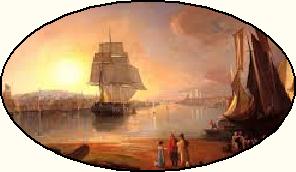Spadina Literary Review — edition 5 page 11
.../
Oliver has other fish to fry. Within seconds he gets back to the main flow of “The Rising Village,” dismissing “Albert and Flora” as a mere anomaly. He assures us, as if anxious for the reputation of the colonies, that most couples do adhere to their vows, traversing years of marital bliss thru the mainstream of life till at last they join the spirits of the blessed. Come look here, says Oliver, climb this hill and see how the rising village has become a paragon of peace and prosperity. See the busy mill, the verdant meads, the smiling orchards from here to the ocean. Commerce expands, order prevails. “Happy Acadia!” cries Oliver. And all this is thanks to Britain’s protection. Let Acadia rise like a proud son to match Britain’s glory!

Halifax in peace and prosperity(Artist unknown, circa 1835)
Oliver published “The Rising Village” in England in 1825. As he remembered it, the critics tore him to shreds because his writing was not up to his grand-uncle’s level. Researchers have never unearthed the specific derogatory reviews that so wounded Oliver, but we can see how a number of mildly complimentary reviews that have survived might have rubbed him the wrong way.
“Who will grudge half a crown for a poem by a descendant of Oliver Goldsmith’s?” said London’s Eclectic Review, making Oliver seem like a charity case from the colonies vying to cash in on his grand-uncle’s name.
Even back in Halifax his work was reflexively, and obtusely, compared to Dr. Goldsmith's “Deserted Village.” For example, the Acadian Magazine said it looked forward to further work from Oliver “though we do not think his productions will ever equal those of his great model.”
It's true that our Oliver Goldsmith was not a sparkling stylist. His verses are, let's say, competent. They do their job. He knew he could not match his grand-uncle’s lyric ability. Still, when people are so cheerfully up-front about classifying you as second-rate, it can hurt. After that perceived critical failure, Oliver renounced poetry. “I abandoned the Muses,” he wrote, “and I have not had the pleasure of any further intercourse with the lovely ladies.”
Looking back, what was “Albert and Flora” really about? Over the years various savants have chimed in.
Gerald Lynch (U of Ottawa) interprets “Albert and Flora” in the light of his conviction that “The Rising Village” is all about controlling Nature. The pioneer plants the fields, which is control, but is then beset by "savages," which is loss of control. He builds a village (control), but the next generation slacks off (non-control), etcetera. It’s a fable where Albert = generation next, and his abandonment of Flora (= Acadia + Nature) represents the pioneer forsaking his responsibility to cultivate the land. By inference, Flora’s open-ended madness = chaos, a regression to unhusbanded wilderness.
Critic Kenneth Hughes, meanwhile, claims that “Albert and Flora” is an allegory masking “politically dangerous” thought. Albert, in this view, is a stand-in for the Empire’s ruling class. After all, Oliver calls Albert the “foremost” lad of the village, and says Albert seemed initially to possess a “noble” heart. Need more proof? Well, the name Albert, says Hughes, derives from Old English Aethelbeorht, from Old German Adalbert, which in turn comes from athal ("noble") plus berhta ("bright"). Albert is a kind of Sun King. His desertion of Flora = Britain’s economic abandonment of Acadia when it wound down its wartime economy in 1815 — the very policy that got Oliver laid off! How better to portray this perfidy than to send Flora (= Acadia) out into the freezing night (= economic recession)? Flora’s subsequent rescue by a kindly peasant (= the real people) at sun-up (= fresh start) shows that Acadia can make its way in the world without Britain's help. Oliver’s secret, then, is that, under imperial cover, he’s a crypto-proto-Acadian-nationalist.